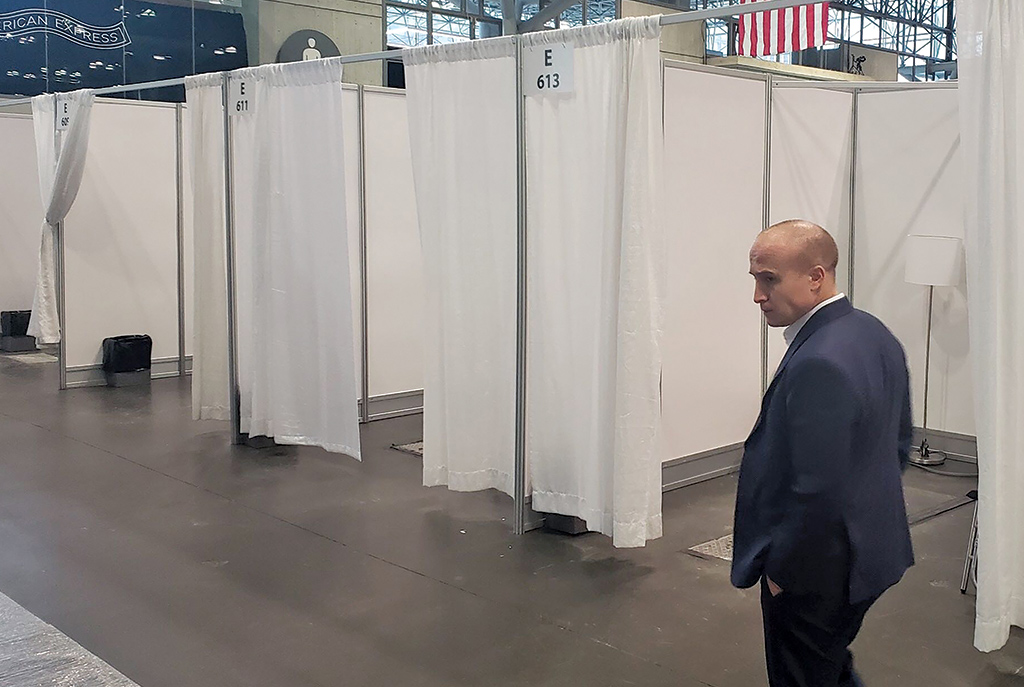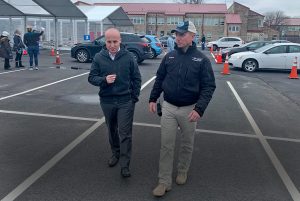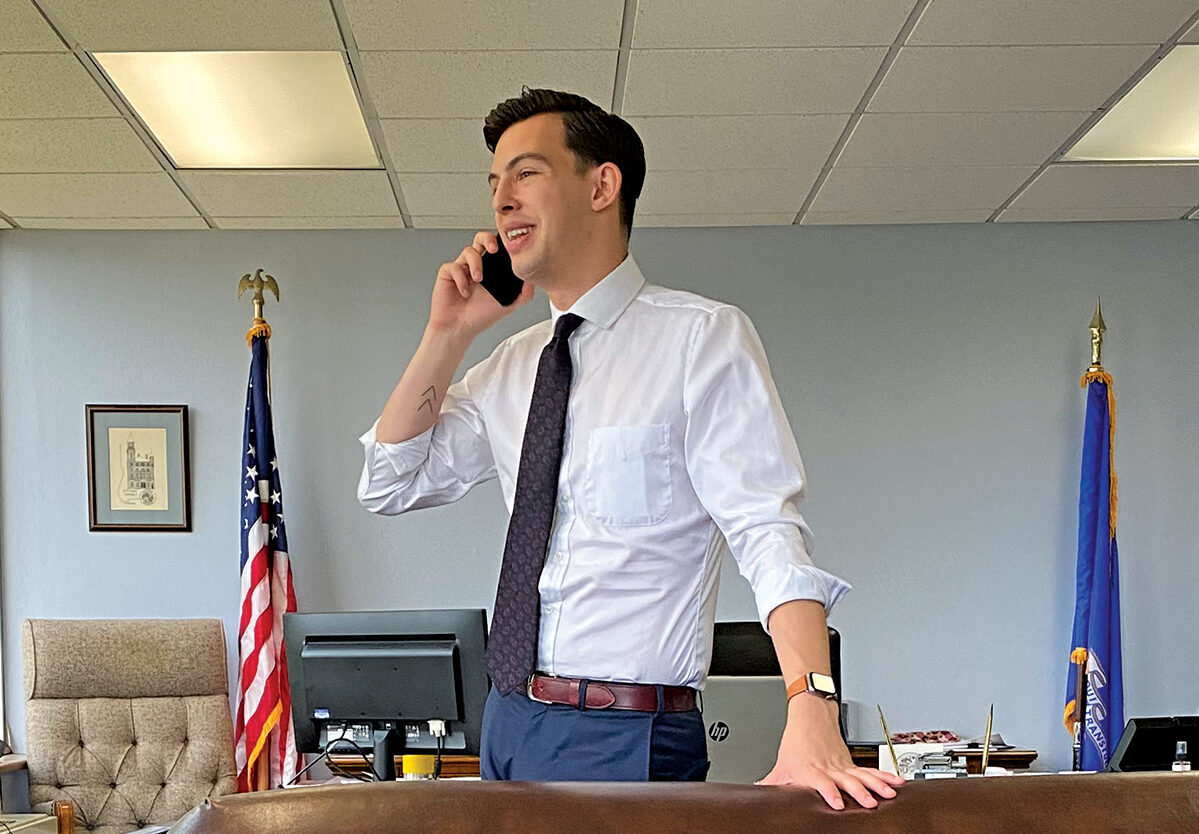On the Front Lines: Max Rose ’08

From meritorious service in Afghanistan to public service in his native New York City, Max Rose ’08 takes an action-oriented approach to serving his country and county.
As an undergrad at Wesleyan, Max Rose ’08 flirted with the idea of becoming an academic. A history major, he went out to lunch downtown with his favorite professor, historian Philip Pomper, to discuss the idea.
“He looked at me and was like, ‘You are way too action-oriented to want to go into academia,’” Rose remembers, laughing. Pomper taught at Wesleyan for 46 years, ample time to get a good read on his students, before retiring in 2010. And he was right. Instead of parlaying his wide-ranging intellectual interests into scholarship, Rose went on to pursue multiple roles with one common thread: harnessing his quick, analytical mind for the public good.
After graduating from Wesleyan, Rose served in the Army from 2010 to 2014, during which he was deployed to Kandahar Province, Afghanistan. He earned a Purple Heart for his service there after the combat vehicle he was riding in drove over an improvised explosive device, injuring his head and one knee. Today, he’s a freshman congressman representing New York’s 11th Congressional District, which includes Staten Island and South Brooklyn, a historically red district that went for President Donald Trump in 2016.
“The opportunity to be in the game, to have the voice to help people, I think is an extraordinary privilege,” he says. His views are liberal but not progressive, per se. He deliberately distinguishes, for example, between “pro-government” and “pro-socialist” while simultaneously arguing that big, bold actions are needed to help heal the country.
Rose’s unapologetic patriotism caused him to stand out somewhat from his peers in Wesleyan’s intimate liberal arts atmosphere. But he credits his undergraduate experience—where he remembers being friends with a wide, diverse group of classmates and working to become “as much of a generalist as possible”—with helping him hone his interests, work ethic, and character.
“When you think about what Wes prides itself on, it’s an interdisciplinary focus. It’s breaking down silos” and prioritizing intersectionality, he says. He sees government work as similar, noting that a broad grasp of how issues intersect is crucial to helping constituents. “You move from issue to issue and you try to understand it at a high level.”
Speaking to him is a crash course in this outlook in action: His words unspool in fully formed paragraphs, full of rapid-fire, thoughtful connections and a profane enthusiasm that makes a Zoom call seem, for once, like an intimate meet-up. The New York Times described him as “a swaggering (and sometimes profane) straight shooter.”
“Yes, (Wesleyan) gives you information and access to information, but it gives you tools to think. And that’s my most valuable resource right now,” he says. “To think quickly and to think comprehensively and deeply.”
According to Pomper, Rose was an active participant in seeking out and ensuring he reaped the benefits of his education.
“He tended to show a lot of confidence in the way he proposed something in a seminar or a class,” Pomper said. “Max is a certain kind of very positive student who has just the right amount of reflection and aggression.”
Doing It All
Rose, a native of Brooklyn, used those abilities to convince voters in a conservative district in 2018 that he was the right candidate to represent their interests in Congress. And he’s using them now to respond full-bore to the multiple crises currently facing the country.
“It’s a matter of urgency that requires a whole-government approach, and the enemy is shy, milquetoast incrementalism,” Rose said of the federal COVID-19 response.
He was the first U.S. Representative to deploy with the National Guard to assist in coronavirus relief efforts, helping set up a field hospital in his district for two weeks at the height of the pandemic. The assignment included tasks like driving to Pennsylvania to pick up garbage cans for the new hospital. And whatever else needed doing.
“I’m fairly certain I saw Max Rose making a bed,” Brahim Ardolic, the executive director of Staten Island University Hospital, told Politico in April.
The deployment ended up keeping him away from home for a month, including a two-week quarantine period. Then Rose was able to return to sheltering in place with his wife and infant son in Staten Island.
Because, oh right, he is also the father of a gorgeously cheeked newborn, Miles, born in March and adopted by Rose and his wife, Leigh, as the virus started accelerating throughout the East Coast.
Man on a Mission
Someone observing undergraduate Max Rose would be forgiven for not betting on his future as a politico. After all, he only managed one Wesleyan Student Association (WSA) campaign and ran in another, and neither panned out.
“We got our ass kicked,” Rose said, referring to the campaign he managed for Adit Shah ’08. He ran what he and Shah both described as an upstart campaign against “entrenched student leadership,” spinning what Argus accounts at the time described as Shah’s underwhelming WSA attendance record into an asset: a valuable outsider’s perspective. “My life at Wes was actually a series of electoral defeats,” Rose said, grinning, tongue firmly in cheek. Then, more earnestly: “I was obsessed with service in college.”
But Rose’s ascent doesn’t surprise Shah, who met him early freshman year and lived with him when they were seniors.
“I just remember him—he’d be sitting in bed in the morning. He’d always wake up many hours earlier than me and he’d be in bed watching The West Wing or reading some political biography,” said Shah, who just completed a robotics surgery fellowship in urology. “We’d go out the night before and the rest of us would wake up at whatever time . . . and he’d already gone on a however-many-mile run. He had a work ethic that always motivated me and inspired me.”
 It’s that work ethic that drives Rose still. He has been focused on mitigating the effects of COVID-19 on his constituents, securing rapid results testing and emergency tents for Staten Island hospitals, introducing legislation that would give federal benefits to first responders disabled by or killed by the virus, and pushing President Trump to consider pooled testing, which scans multiple blood samples simultaneously to expand diagnostic access.
It’s that work ethic that drives Rose still. He has been focused on mitigating the effects of COVID-19 on his constituents, securing rapid results testing and emergency tents for Staten Island hospitals, introducing legislation that would give federal benefits to first responders disabled by or killed by the virus, and pushing President Trump to consider pooled testing, which scans multiple blood samples simultaneously to expand diagnostic access.
“The fight is calls, letters, public advocacy. It’s never easy and it’s never simple,” Rose says.
It’s all happening midway through his first re-election campaign in the midst of a continuing pandemic, which has hit parts of Staten Island especially hard, as well as generation-defining police brutality protests. And there’s no rest for the weary at home, either, as new fatherhood has meant his sleep has been erratic at best.
But Rose remains steadfast in his mission.
“I genuinely love it,” Rose said of his public service work. “I find it deeply intriguing and deeply exciting.”
Author Kira Goldenberg is a graduate of Barnard College and a freelance writer living in New York City.
Read more: Rose offers four easy ways to make positive change in your community.



